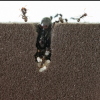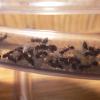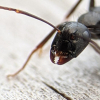- Formiculture.com
- Forums
- Gallery
- Members
- Member Map
- Chat

why alternatives to fluon ?
Started By
mete
, Sep 15 2024 2:06 AM
9 replies to this topic
#1
 Offline
-
Posted September 15 2024 - 2:06 AM
Offline
-
Posted September 15 2024 - 2:06 AM
I see there are posts about alternative barriers, other than fluon. Is there a particular reason for alternatives ? Fluon does not seem to be expensive for the quantity used.
#2
 Offline
-
Posted September 15 2024 - 3:38 AM
Offline
-
Posted September 15 2024 - 3:38 AM
Cost is the main reason many youngsters don’t want to buy fluon. Talc mixed with alcohol is a great alternative. Some keepers have success with mineral oil as well.
- Barristan and Ants_Dakota like this
"The ants are a people not strong, yet they prepare their meat in the summer." Prov. 30:25
Keep ordinary ants in extraordinary ways.
Keep ordinary ants in extraordinary ways.
#3
 Offline
-
Posted September 15 2024 - 6:39 AM
Offline
-
Posted September 15 2024 - 6:39 AM
Cost is the main reason many youngsters don’t want to buy fluon. Talc mixed with alcohol is a great alternative. Some keepers have success with mineral oil as well.
Agreed. At least a few years ago when I purchased mine, it was a 4 dollar baby powder bottle vs. 40 dollars of fluon. That is pretty deterring. I think it is better now though.
Go to the ant, you sluggard; consider its ways and be wise! It has no commander, no overseer or ruler, yet it stores its provisions in summer and gathers its food at harvest. -Proverbs 6: 6-8
My Nationwide Ant Shop Here I have PPQ-526 permits to ship ants nationwide
Attention Ant-Keepers in South Dakota! Join the SoDak(Society Of Dakotan Ant Keepers)
#4
 Offline
-
Posted September 15 2024 - 7:38 AM
Offline
-
Posted September 15 2024 - 7:38 AM
I see there are posts about alternative barriers, other than fluon. Is there a particular reason for alternatives ? Fluon does not seem to be expensive for the quantity used.
It depends, fluon from THA is $9-$600. https://tarheelants....roducts/fluon-1
Edited by AntsGodzilla, September 15 2024 - 7:38 AM.
I keep: pogonomyrmex rugosus | myrmecocystus depilis | monomorium ergatogyna | Camponotus CA-02 | Pheidole Bicarinata
And many Carnivorous plants such as: Dionea muscipula (fly trap), Sarracenia x 'Fiona' ( American Pitcher plant), Nepenthese ventrata (Tropical Pitcher plant), and Pinguicula agnata x emarginata (Butterwort) (show off your plants here)
Go to the ant, you sluggard; consider its ways and be wise! It has no commander, no overseer or ruler, yet it stores it's provisions in summer and gathers its food at harvest. Proverbs 6: 6-8
#5
 Offline
-
Posted September 15 2024 - 11:42 AM
Offline
-
Posted September 15 2024 - 11:42 AM
Talc powder mixed with rubbing alcohol is cheaper for the amount you get, and can sometimes work better than fluon, unless you have a massive colony that is always trying to escape.
“You’ll survive” -wise man.
Currently keeping:
Brachymyrmex patagonicus
Solenopsis invicta
Crematogaster sp.
#6
 Offline
-
Posted September 15 2024 - 11:46 AM
Offline
-
Posted September 15 2024 - 11:46 AM
Talc powder is also an excellent escape barrier.
You can also apply it dry with your finger. A little bit messy, but works fine too.
Edited by Barristan, September 15 2024 - 11:47 AM.
#7
 Offline
-
Posted September 15 2024 - 12:33 PM
Offline
-
Posted September 15 2024 - 12:33 PM
Go with fluon if you want your hands to be free of skin tags
#8
 Offline
-
Posted September 15 2024 - 5:21 PM
Offline
-
Posted September 15 2024 - 5:21 PM
Aside from price, fluon isn't always the best option for where you live and/or the setup you keep your ants in. PTFE barriers breaks down relatively quickly in higher humidity, which means using a setup that has a lid will lead to it breaking down faster than other options. Additionally, it's difficult to "patch" or "touch up" spots in PTFE barriers that are breaking down, whereas with other barriers you can directly apply over top of the original barrier. The upsides to PTFE is that for very large colonies, it's much tougher for the ants to wear down the barrier because the ants slip off of it, unlike with talcum powder.
- mbullock42086, ANTdrew, cocdeshijie and 1 other like this
#9
 Offline
-
Posted September 15 2024 - 7:57 PM
Offline
-
Posted September 15 2024 - 7:57 PM
other than stuff mentioned above
talc is easier to clean than fluon
- Barristan and rptraut like this
誰でも大好き!well.....except a few
cocdeshijie’s Formicarium Guides: https://cocdeshijie....cfe2df393b517f7
Ants API: https://ants-api.qwq.xyz/
#10
 Offline
-
Posted September 16 2024 - 11:12 AM
Offline
-
Posted September 16 2024 - 11:12 AM
Aside from price, fluon isn't always the best option for where you live and/or the setup you keep your ants in. PTFE barriers breaks down relatively quickly in higher humidity, which means using a setup that has a lid will lead to it breaking down faster than other options. Additionally, it's difficult to "patch" or "touch up" spots in PTFE barriers that are breaking down, whereas with other barriers you can directly apply over top of the original barrier. The upsides to PTFE is that for very large colonies, it's much tougher for the ants to wear down the barrier because the ants slip off of it, unlike with talcum powder.
Good to know, I didn't know its property changes with humidity. Is there a certain number for higher humidity ? >70% ?
1 user(s) are reading this topic
0 members, 1 guests, 0 anonymous users




















